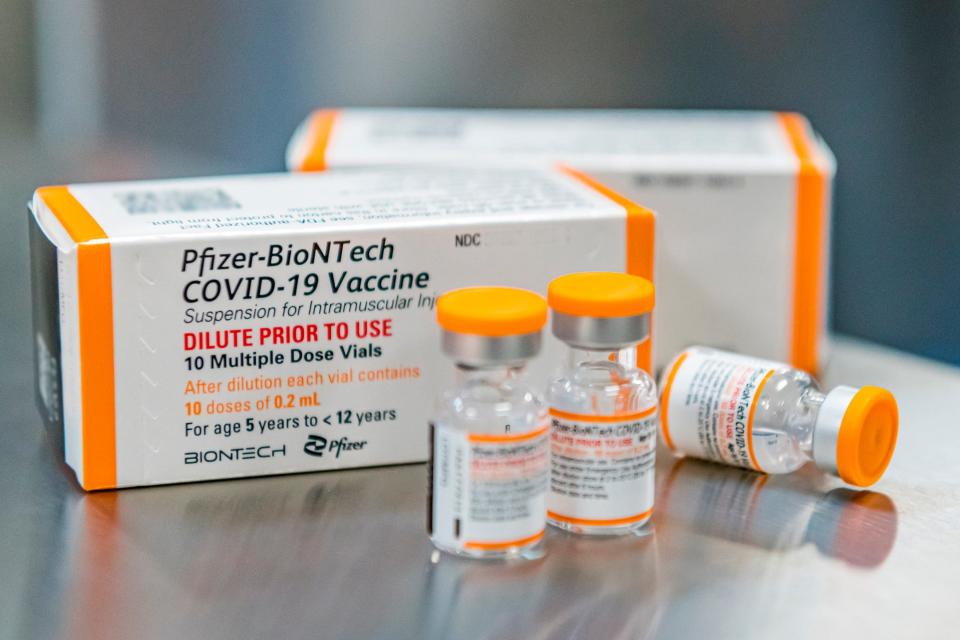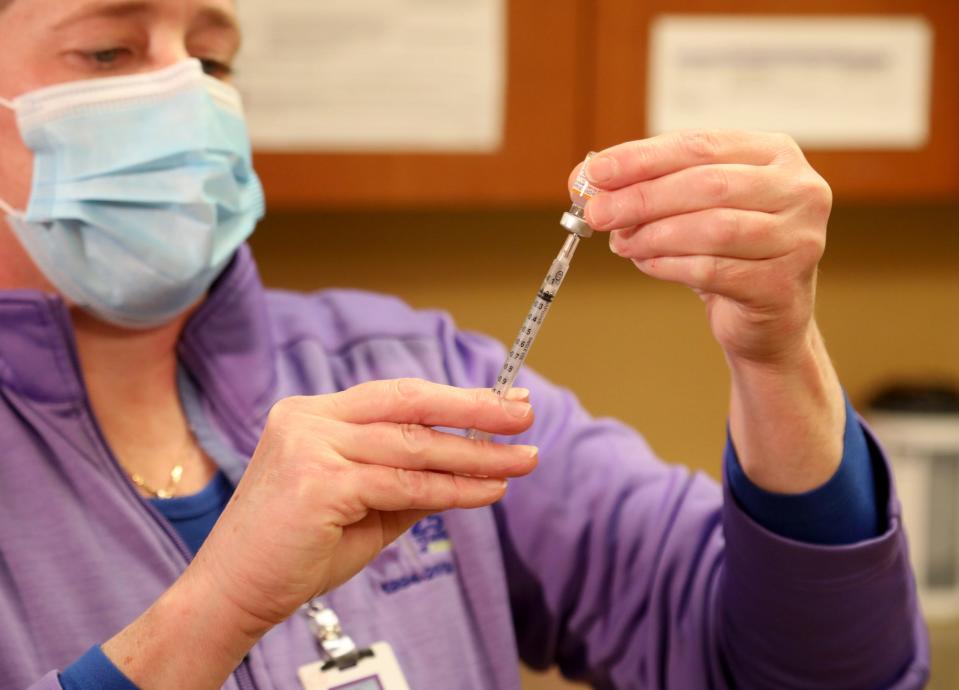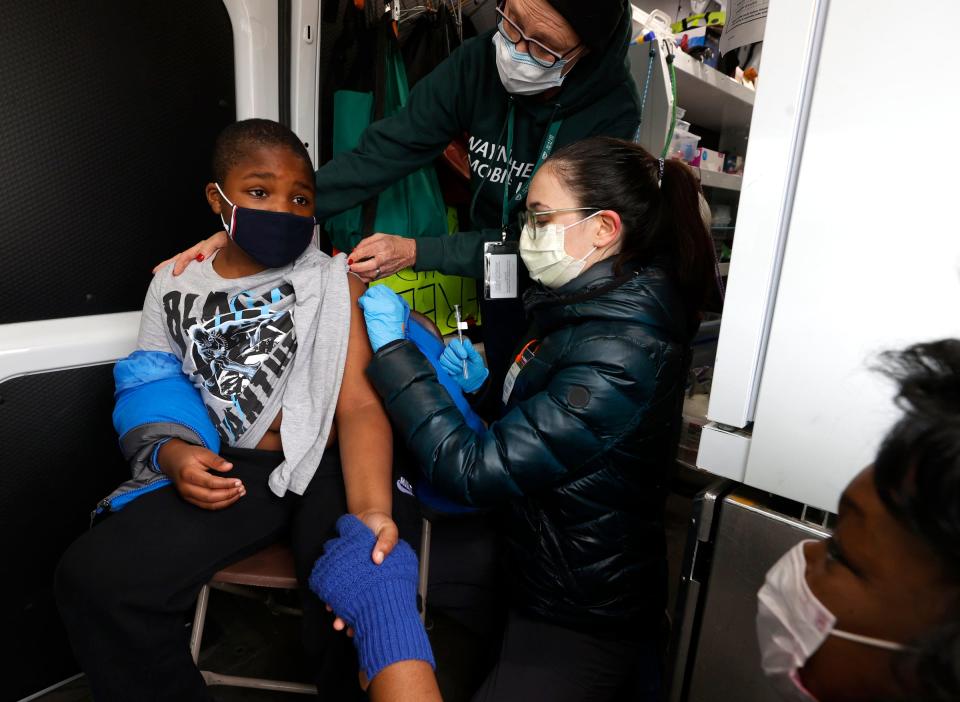Get COVID-19 booster now — or wait for new vaccine formula? We asked the experts
Pfizer and its German-based partner BioNTech applied this week to the U.S. Food and Drug Administration seeking approval for authorization of a COVID-19 booster formulated to target both the original SARS-CoV-2 virus and the BA.4/BA.5 omicron subvariants.
The company is targeting adults and adolescents ages 12 and older for the bivalent booster, promising to begin shipments of the updated vaccine "immediately pending authorization."
As of Tuesday, it was unclear when federal regulators would consider the application, but the Biden administration has been pressing for a September rollout of the updated vaccine with an aim of preventing a fall surge.
More: Michigan private schools got public funds for COVID-19 relief: How it was spent isn't clear

19 COVID-19 deaths per day in Michigan
Already, spread of the virus is considered high in 18 Michigan counties — Wayne, Oakland, Macomb, Livingston, Genesee, Washtenaw, Monroe, Kalamazoo, Calhoun, St. Joseph, Lake, Manistee, Mackinac, Menominee, Gogebic, Ontonagon, Iron and Dickinson, according to the U.S. Centers for Disease Control and Prevention.
In these communities, the CDC recommends people wear a high-quality mask or respirator and for those at risk for severe COVID-19, consider avoiding nonessential indoor activities in public.
Every day in the last week, an average of 2,773 people contracted the virus in Michigan, and 19 people died from COVID-19, state data shows. The percentage of positive cases statewide was 20.26% as of Aug. 22, and 1,070 Michiganders were hospitalized with COVID-19.
Should school kids get COVID-19 boosters now?
As schools begin to reopen for a new academic year, many parents are trying to decide whether to schedule booster-eligible kids for a dose of the COVID-19 vaccine now or wait until the reformulated version is available.
"It really is the $60,000 question, quite honestly, whether you get it now or wait for a specific booster," said Linda Vail, health officer for the Ingham County Health Department.
The problem, she said, is that the approval process for vaccines can be time-consuming. Before shots can go into arms, the vaccine must first be reviewed by an independent FDA committee, then get approval from the FDA director. After that, a CDC advisory panel must review the data and make its recommendation. Then the director of the CDC must approve it.
More: Listen to the 'On The Line' podcast: Monkeypox, the other outbreak
More: Michigan universities prep for threat of on-campus monkeypox outbreaks
All of that takes time and there is no guarantee that the vaccine will win regulatory approval for use in all age groups and populations, she said.
"The problem that I see in that is that we've been told that there will be a specific booster ... and oftentimes, it doesn't happen by the time that they tell us they think it's going to happen," Vail said.
"We certainly don't want to get into the surge that we expect a little bit later in the fall and through the winter without making sure that everybody is up to date.
"The best advice for everybody is to be up to date. That is just flat-out the best advice."
More: Michigan health leaders on 'high alert' for polio as vaccination rates continue to fall
More: 32% of Michigan toddlers at risk for preventable diseases as vaccination rates fall

Are you up to date on COVID-19 vaccines?
With the current COVID-19 vaccine recommendations, here's what health leaders mean when they say you should be up to date:
Children ages 6 months to 4 years: A three-dose primary vaccine series.
Children ages 5 to 11 years: A booster shot at least five months after a two-dose primary vaccine series of the Pfizer vaccine. Those who've had two doses of the Moderna vaccine are considered up to date at this time.
Adolescents ages 12-17 years: A booster at least five months after a two-dose primary vaccine series of the Pfizer vaccine. Those who've had two doses of the Moderna vaccine are considered up to date at this time.
Adults ages 18-49 years: A booster at least five months after a two-dose primary series of the Pfizer or Moderna vaccines. Those who had the single-dose Johnson and Johnson vaccine should get a booster at least two months after the first dose.
Adults ages 50 and older: A first booster at least five months after completing the primary series of the Moderna or Pfizer vaccines. A second booster of either the Moderna or Pfizer vaccine is recommended at least four months after the first. Those who had the single-dose Johnson and Johnson vaccine should get a booster at least two months after the first dose. A second booster is recommended at least four months after the first J&J boost.
People who are immune compromised may need additional doses. For a complete schedule, go to: https://www.cdc.gov/coronavirus/2019-ncov/vaccines/stay-up-to-date.html

Most Michiganders are eligible for a booster
The majority of Michiganders aren't boosted at all.
State data shows that only 35.6% of residents ages 5 and up — about 3.35 million people — have gotten at least one booster shot.
COVID-19 vaccine uptake is lowest among the state's youngest children. Only 4.7% of kids 6 months to 4 years old are fully vaccinated. Among 5- to 11-year-olds, about 29.8% have been fully vaccinated, but only 3.6% have been boosted.
"I'm urging parents to make it a priority now as their kids are returning to school to make those doctor's appointments and to make sure their kids are up to date on all recommended vaccines including their COVID vaccine primary doses and boosters," said Terri Adams, director of the Division of Immunization for the Michigan Department of Health and Human Services, during a news conference last week.
More: 43 E. coli cases in Michigan, many hospitalized, linked to outbreak in 4 states
More: Monkeypox vaccines to be finished at west Michigan company
While some people may be waiting for that newly reformulated omicron bivalent vaccine, Dr. Dennis Cunningham, Henry Ford Health's director of infection control and prevention, said the vaccines available now "do work against omicron."
"You have great levels of protection for three months," he said. "They slowly start dropping these protective antibodies, and then they really drop off around six months," which is why it's so important to get boosters and stay up to date.
"But even as they're dropping, the vaccines are still very protective against severe disease, hospitalization and death. ... For kids, I would encourage you to get the booster they can get right now. It does work. By the time the newer booster for adults is studied and approved for use in kids, I suspect it will be early next year."
Dr. Michelle Day, a Henry Ford Health pediatrician, encourages parents who have questions or concerns about COVID-19 vaccines and boosters to talk to their child's pediatrician.
"There are definitely families who are still feeling hesitant," she said.
"I want to encourage families to come in and have that discussion with your pediatrician just to have their questions addressed. With going back to school, kids are going to be again in enclosed spaces, sitting together for circle time, working on projects. This group of kids may not be at their peak for good handwashing, hygiene, remembering to keep their hands or other objects out of their mouths.
"It just takes one child to spread illness. ... The safest way, the best way to keep your child safe and to provide protection to the community is to get your child vaccinated."
Contact Kristen Jordan Shamus: kshamus@freepress.com. Follow her on Twitter @kristenshamus.
This article originally appeared on Detroit Free Press: Get COVID-19 booster or wait for new vaccine? Experts weigh in

